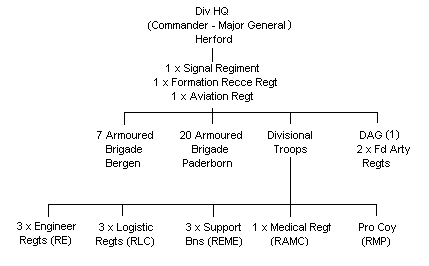|
The 1st Armoured Division was formed in 1940. Since World War II the
Division has been re-titled three times and became the 1st (United
Kingdom) Armoured Division in 1993, having successfully fought in the
Gulf War of 1991. The Division has its headquarters at Herford in
Germany and currently (2011) commands two Armoured Brigades situated
throughout North West Germany and is the major component of British
Forces Germany.
British Forces Germany (BFG) is the composite name given to the British
Army, Royal Air Force and supporting civil elements stationed in
Germany. The terms British Army of the Rhine (BAOR) and Royal Air Force
Germany (RAFG), until recently were the traditional names used to
describe the two Service elements of the British Forces stationed in
Germany.
For many years following World War II, and as a result of the
confrontation between NATO and the former Warsaw Treaty Organisation,
the UK Government had stationed four Army divisions and a considerable
part of its Air Force at five airbases in the Federal Republic of
Germany. On the whole this level of commitment was maintained until 1992
and although these forces appeared to be solely national, they were in
fact closely integrated with the NATO Northern Army Group (NORTHAG) and
the 2nd Allied Tactical Air Force (2 ATAF).
As a result of political changes in Europe and the UK Government's
'Options for Change' programme, the British Army's presence in Germany
has been reduced to two armoured brigades and a divisional headquarters
with logistical support. The majority of the RAF presence has since been
withdrawn and the 2010 SDSR announced plans to withdraw all of BFG to
bases in the UK by 2020. It is likely that a large number of major units
will be returned to the UK well before that date.
COMPOSITION OF 1 (UK) ARMOURED DIVISION
1 (UK) Armoured Division has its
headquarters at Herford in Germany (about 50kms from Hanover) and the
three Armoured Brigades under command are located at Osnabruck, Bergen-Hohne
and Sennelager. This division will return to the UK at some stage during
the next five years.

Divisional Structure HQ
1 (UK) Armoured Division

|
|
Note: (1) DAG (Divisional
Artillery Group) This DAG could be reinforced by Rapier Air Defence and
MLRS units from the UK as necessary. (2) Personnel total in Germany is
approximately 18,500 with about 17,000 in 1 (UK) Armoured Division.
During early 2011 this Division could probably provide the Headquarters
(HQs) for up to six Battlegroups.
Personnel totals in Germany will probably fall to around 15,000 from late
2009. During 2009 this Division could probably provide the Headquarters
(HQs) for up to six Battlegroups.
Estimate of Force Levels in 1 (UK) Armoured Division (1 Jan 2011 – our
estimates)
Army Personnel
17,000
Challenger 2 MBT
100
Warrior AIFV
300
Other Tracked Vehicles 900
Helicopters (Army Aviation) 24
Artillery Guns
48
MLRS
0
AVLB
18
It is probable that in the event of hostilities (as was the case in
recent operations in Iraq) considerable numbers of officers and soldiers
from the Territorial Army (TA) would be used to reinforce this division.
These reinforcements would consist of individuals, drafts of
specialists, or by properly formed TA units varying in size from Mobile
Bath Units of 20 men, to Major Units over 500 strong.
UKSC(G)
The United Kingdom Support Command (Germany) has responsibility for
British Army Troops on the Continent of Europe that are not part of 1st
(United Kingdom) Armoured Division. Its headquarters replaces that of
the British Army of the Rhine, whose sign it has adopted. The
headquarters of UKSC(G) is located at Rheindahlen and has about 3, 600
personnel under command.

102 LOGISTICS BRIGADE
This brigade provides third
line combat service support wherever this is required army wide but is the
first ‘port of call’ for combat service support to 1st Division. The
Brigade Headquarters is at Gutersloh in West Germany, reasonably close to
the Headquarters of 1st Division in Herford. The Brigade, with units based
around a core group of 3 x RLC Regiments is due to return to Cosford in
the UK between 2009 and 2012.

POSSIBLE CHANGES IN THE
BFG STRUCTURE
In addition to the mid 2006 announcement of the move of 4 Armoured Brigade
from Germany to the UK, the Secretary of State for Defence has announced
the intention to make further adjustments to the structure of the British
Forces in Germany.
These include proposals for the return to the UK of Headquarters Allied
Rapid Reaction Corps (HQ ARRC) to Innsworth (Gloucestershire) in 2010.
Additionally 102 Logistic Brigade and 1 Signal Brigade will move to
Cosford (Shropshire) over the period 2009-2012.
There are also plans for a series of minor moves within Germany which will
lead to the closure of Osnabruck Station from during 2009. These moves
will probably result in the concentration of UK Germany-based forces in
Hohne, Paderborn and Guttersloh garrisons.
Once all of these moves have been completed we would expect total UK force
levels in Germany to reduce from around 20,000 to about 14,000.
During early 2011 there
were just over 18,000 UK Service Personnel stationed in Germany over 96
per cent of which were army personnel. Since 2009 a number of major
units have returned to locations in the UK amongst which were HQ Allied
Rapid Reaction Corps (HQ ARRC), 102 Logistics Brigade (102 Log Bde) and
1 Signal Brigade (1 Sig Bde).
During the late 2010 SDSR the Secretary of State for Defence announced
the return of half of UK personnel from Germany by 2015 and the
remainder by 2020.
The estimated cost to the public purse of maintaining and operating
bases in Germany in 2010-11 is approximately £190 million. It is
believed that the net injection to the German economy from the UK
presence in Germany is around £700 million and following the return from
Germany a similar sum will be injected into the UK economy.
|